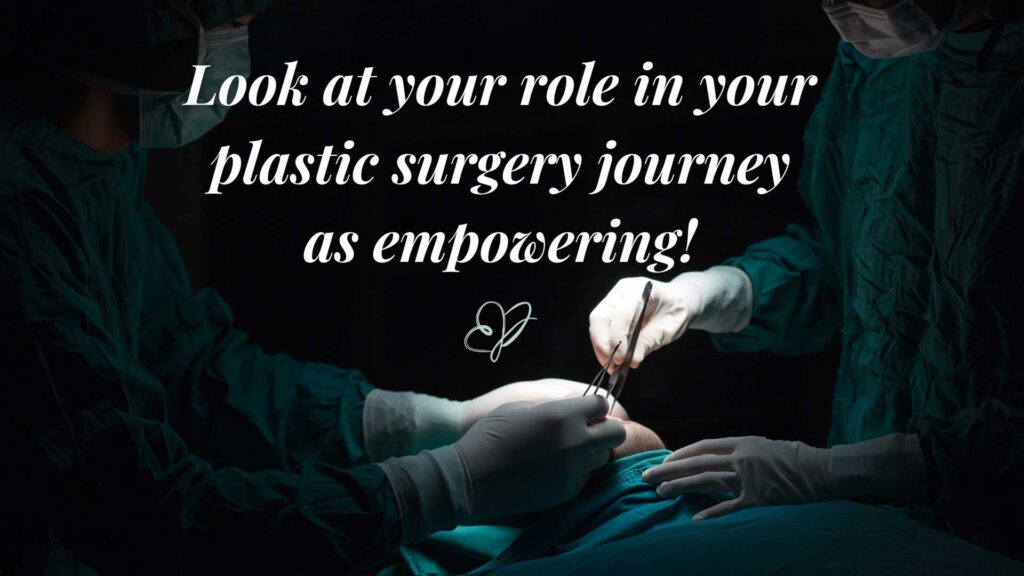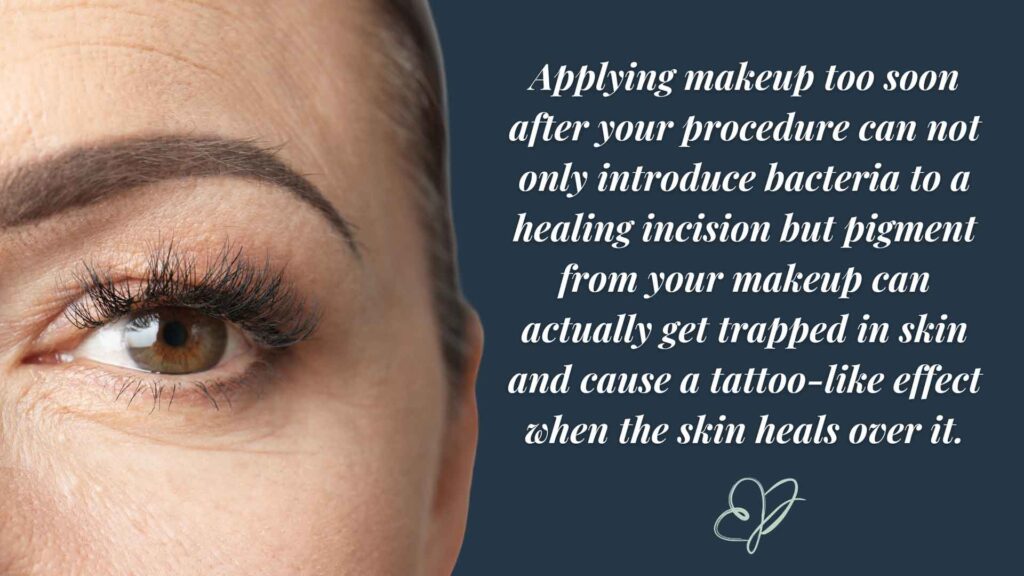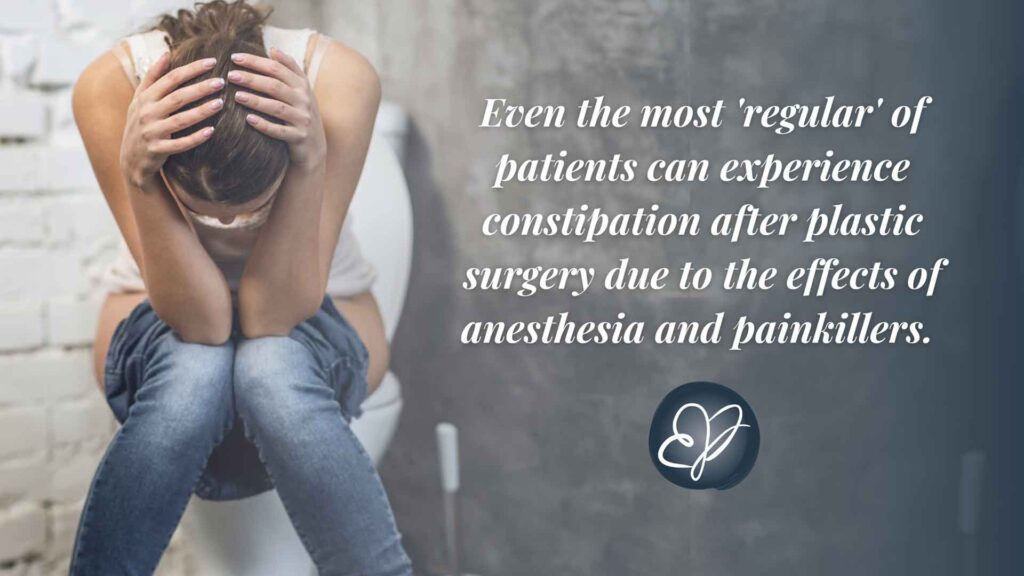Did you know that YOU play a crucial role in your plastic surgery results? Yes, your plastic surgeon’s qualifications, experience, and skill matter considerably, but how you prepare for your surgery and how disciplined you are with your recovery strategy carry just as much weight. Instead of finding this intimidating, look at your role in your plastic surgery journey as empowering! Your plastic surgeon will advise you on several things to avoid both before AND after your surgery. Here are nine things your surgeon may ask you to abstain from after your procedure to ensure you get the best outcome.

#1 – Looking UP after facelift surgery
All plastic surgeries have specific movement restrictions afterward that must be followed to ensure a healthy recovery. The higher the impact of the activity, the riskier it is, as dramatic increases in blood pressure can affect blood collection, lymphatic drainage, and even bruising.
After facelift surgery, you’ll need to avoid high-impact movements as well as putting any strain on sutures. This means that stretching your neck excessively in any direction is off-limits, especially looking up. For a few weeks, you’ll need to embrace rotating from your waist to turn and look at someone and make sure that anything you want to see is held at eye level, not above your head.
#2 – Looking DOWN after chin liposuction
Ditch your smartphone or laptop for a few hours, and you’ll soon realize how often you look down during the day! Scrolling through social media on our phones and typing on our computers forces many of us to tuck our chins in for extended periods throughout the day. This action will need to be avoided after chin liposuction. Why? When liposuction is performed under the chin, it temporarily separates skin from the muscle and subcutaneous fat and creates a space. As you recover from chin liposuction, you want the skin to redrape and heal in an attractive position. That means you’ll need to avoid the movement of looking down and the compression it causes to the skin under the chin.
Compression garments are key in chin liposuction recovery for this reason, as they inhibit unfavorable movement. A chinstrap is often used for the first 48 hours after surgery before a patient transitions to a foam neck collar during the day, which prevents them from looking down.
#3 – Applying eye makeup too soon after blepharoplasty
Picture this – you love your facial plastic surgery results and can’t wait to show them to the world. So, what do you do? You put on makeup for an evening out with friends. STOP! Unless your plastic surgeon has given you the go-ahead to wear makeup again, avoid it, especially after blepharoplasty surgery.

Surgical incisions need time to heal after surgery. Applying makeup too soon after your procedure can not only introduce bacteria to a healing incision but pigment from your makeup can actually get trapped in skin and cause a tattoo-like effect when the skin heals over it. Plus, makeup that gets applied must be removed, often requiring wiping and tugging at the skin. Two things you definitely want to avoid after surgery! If you haven’t worn eye makeup in a while, make sure that when your surgeon gives you the go ahead to apply makeup, that the makeup is relatively new. Mascara and eyeliner should be replaced every 3-6 months, and eyeshadow every 6-12 months, due to potential for bacterial growth in the makeup.
#4 – Wearing your glasses too soon after rhinoplasty surgery
Your nose will be tender after rhinoplasty surgery. It may even have a temporary bump or dent as it heals. The last thing that delicate tissue needs is the weight of a heavy pair of glasses or readers on it. Glasses can also inhibit circulation in tissue as they compress the skin of the nose. Circulation is vital to recovery and needs to be free from obstacles. Prepare before surgery by having contact lenses as a backup. If you love reading, consider apps like Audible, and download books to listen to during your recovery.
#5 – Taking your post-surgical bra off too soon after breast augmentation surgery
Ladies, we understand. Sometimes there is nothing better than removing your bra at the end of the day. However, too soon after breast augmentation surgery is NOT the time to do it. Your post-surgical bra should stay on 24/7 until your plastic surgeon advises you that it is ok to remove it while showering and throughout the day. Why? This bra supports the ideal placement for your breast implants, helps tissues heal, and prevents skin from straining along any incisions. Plus, having a supportive bra prevents the pain of having the weight of the breasts strain against the chest wall while you are healing.
#6 – Using a heavy purse or backpack after breast augmentation surgery
Women tend to carry a lot in their purses. However, items like water bottles, books, laptops, and makeup pouches can make purses heavier than we realize! Your plastic surgeon will advise you to avoid carrying anything over five pounds after your breast augmentation surgery. This restriction is because any more weight can strain chest muscles and potentially damage healing tissues and incisions. So, if breast augmentation is in your future, consider downsizing your purse now and transitioning to a backpack with rollers!
#7 – Not embracing stool softeners after tummy tuck surgery
There is nothing sexy about stool softeners, let’s face it. But leave any giggles or embarrassment at the door when it comes to bowel movements after tummy tuck surgery. Even the most ‘regular’ of patients can experience constipation after plastic surgery due to the effects of anesthesia and painkillers. Opiates and anesthesia go hand in hand with constipation, unfortunately. Bowel medications should ideally be started the day of surgery. Constipation can complicate your recovery from tummy tuck surgery if you are straining to go to the bathroom, as this affects the pressure in your abdomen and may pull on muscles that have been tightened during your surgery. Plus, constipation can lead to bloating and distension in the abdomen, which feels uncomfortable and can jeopardize your results if left unchecked. Follow your plastic surgeon’s recommendations for stool softeners after surgery, and be sure to communicate with them if you are still having trouble with constipation.

#8 – Flying in an airplane too soon after liposuction, or ANY plastic surgery
As a general rule, schedule all flights with caution after any plastic surgery. Drastic changes in elevation and pressure are a recipe for disaster when it comes to potential swelling and the risk of blood clots after surgery. This can be especially dangerous after liposuction when compression garments may be worn on a large portion of the body. Communicate any travel plans with your plastic surgeon, and be sure to have them sign off on any travel that takes place within a month after your surgery.
#9 – Not discussing any concerns you may have with your plastic surgeon
Most plastic surgeons will tell you that they’ve heard it all, so don’t be embarrassed to share ANY concerns you may have during your recovery after plastic surgery. If you think something looks weird, your bruising is lasting longer than you thought it would, you have numbness in an area, or you can’t go to the bathroom – SHARE THIS with your plastic surgeon! There is no shame in questioning any part of your recovery process, and your surgeon will want to support you! Waiting around for a symptom to go away on its own isn’t just anxiety-inducing; it can also jeopardize your results if it is a marker of a more significant issue. The sooner you communicate your concerns with your plastic surgeon, the sooner they can address them and put your mind at ease. Keep all lines of communication open after surgery.
Schedule a complimentary consultation to discuss achieving your aesthetic goals with plastic surgery with an Edina Plastic Surgery board-certified surgeon by calling (612) 688-3135, texting (952) 925-1765, or by CLICKING HERE!


